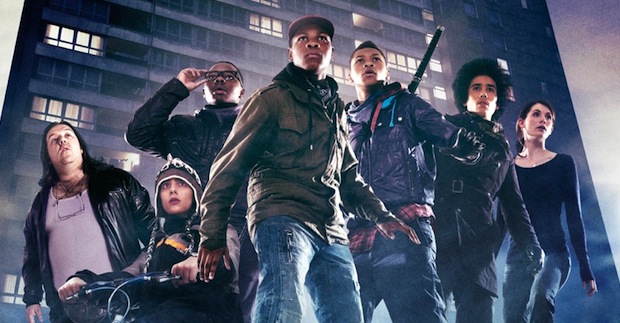
Written by UTG critic Grace Duffy, Scene & Heard takes a look at the music that makes our favorite films so memorable. Whether it’s the 400-piece orchestra Christopher Nolan used for The Dark Knight, or the dozen or so bands that contributed to the soundtrack of Top Gun, there is no denying the impact music has on movies and this column hopes to highlight the best of the best.
If you have a suggestion for a film we should cover on Scene & Heard, please contact us by emailing utgjames@gmail.com.
Attack the Block is one of the lesser known gems of the year. The kind of film that demands no expectations but somehow ends up becoming one of your favorite movies ever, it was extolled by critics in its homeland of the UK and deserved to find a much wider audience than it did. The basic alien invasion concept mightn’t seem that involving at first – even if this crowd have glow in the dark teeth – but the inauspicious locale of a London council block afforded the film a unique selling point unlike anything else you’d see this year. A plethora of great films have been made using unknowns on a shoestring budget, but few have the authenticity and effortless good humor of this one. The filmmakers’ decision to pluck youths from ordinary estates and schools for the lead roles and, further, allow them some free reign over the dialogue worked wonders for the film’s appeal. The real-life experience and influence of the young actors lends the movie a sense of gritty urban realism that makes the events almost believable. Day-glo aliens mightn’t be that likely to attack an underprivileged area near you anytime soon (though let’s just say they could do wonders for the estate I grew up in), but if they did, you get the feeling this is exactly how things would go down.
The film’s score is predominantly made up of original compositions by Steven Price, Felix Buxton, and Simon Ratcliffe, as well as “The Ends” by Basement Jaxx and “Get That Snitch” by Mikis Michaelides. The latter is one of the more prominent tracks on the soundtrack, informing the actions of one character in particular. Before the aliens invade properly and all hell breaks loose, the leading gang of characters seek solace in the titular block of flats and ask head honcho Hi-Hatz (Jumayn Hunter) whether they can keep the creature they’ve just killed in the heavily fortified ‘weed room’ (no prices for guessing its purpose). In the course of this conversation, gang leader Moses (John Boyega) is pushed into taking some of the drugs to sell on the streets. To make a long story short, when the gang of youths later crash into Hi-Hatz with a police van and the aliens that have been pursuing them tuck into his sidekick, he’s not best pleased and, believing they somehow set the whole thing up, plans vengeance. “Get That Snitch” is used as a brooding backdrop to this ill-destined plan, its threatening overtures adding an air of genuine malevolence to the ensuing madness. It’s an atmospheric track, catchy and intimidating, that stands out on a score otherwise populated by curious, exhilarating numbers that evoke the bedlam caused by the aliens and sideline the only real human threat involved.
“The Block” is the title theme, a dextrous mixture of unassuming swagger and more climactic electronics. It’s very urban, rather loose and devil-may-care, the blank simplicity of it all matching the inelegance of the set-up and surroundings. The synthesized flashes of something more frenzied and portentous give it depth and energy, a little variation in theme that enlivens the track and heralds the arrival of something much bigger. The score ups the ante as it progresses, launching into something cataclysmic and biting as the action and violence onscreen escalates.
If one were to discern any subtext within the film’s plot, there’s a very subtle commentary on the character and home life of Moses. His importance and central role is recognised on the score, with five of the twenty tracks named partially for him. “Moses – Ninja” represents his first step towards becoming the hero of the affair, following him as he ‘neutralizes’ an invader. It has a certain dull sense of menace from the off, with sudden shocking climaxes for each twist onscreen. It veers between tense and foreboding, with throbbing musical lines not unlike a heartbeat at times, and more confident posturing. There’s a cheeky, taunting spice to its rhythm as it evolves to incorporate freewheeling synths as otherworldly and extra-terrestrial as the invaders. This unpredictable set-up, including an early hint of a hero’s theme, gives the whole thing the sense of an urban jazz number with kaleidoscopic samples every bit as harebrained as the characters they’re scoring. Further along, “Moses the Hero” complements the youth’s rise to savior of the block, his courageous – and demented – solution serenaded by an ever-escalating current of strings and brash orchestral samples. The ending is almost anti-climactic considering the wave of appreciation onscreen, yet its ignominious fadeout is oddly fitting for a film with such pedestrian origins.
If you haven’t managed to catch Attack the Block yet, I urge you to do so at your earliest convenience. It’s a charmingly simplistic and fun-loving piece that will leave you reeling in more ways than one. Between the sneering refrains of ‘get that snitch’ and lines as quotable as ‘Right now I feel like going home, locking my door, and playing FIFA,’ you’re unlikely to find a more winning recipe for pure entertainment this side of 2012.
- 2015’s Most Underrated Films - December 29, 2015
- Passing The Torch: The End Of An Era For UTG - December 1, 2015
- UTG PREMIERE: Before The Streetlights – “Private Browser” - November 26, 2015

